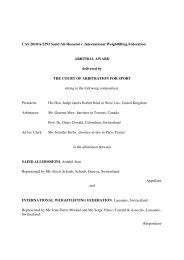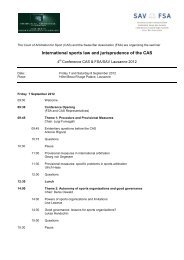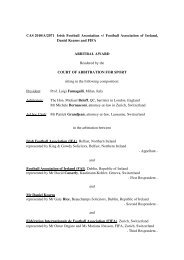(CAS) Bulletin - Tribunal Arbitral du Sport / TAS
(CAS) Bulletin - Tribunal Arbitral du Sport / TAS
(CAS) Bulletin - Tribunal Arbitral du Sport / TAS
You also want an ePaper? Increase the reach of your titles
YUMPU automatically turns print PDFs into web optimized ePapers that Google loves.
The Panel considers that the sanctions, i.e. the<br />
declaration of the matches as forfeited and as a<br />
consequence the exclusion of OLA from the UEL<br />
2011/2012 serves to guarantee a proper functioning<br />
of the football competition within the UEL<br />
2011/2012. The sanctions are appropriate, necessary<br />
and proportionate. In a previous decision, the <strong>CAS</strong><br />
expressly considered that the ratio legis and the<br />
justifi cation of the sanctions are to ensure a legal<br />
certainty in the sports competition of the UEL<br />
2011/2012 (<strong>CAS</strong> 2007/A/1278 and 1279, para. 131).<br />
It must be underlined that UEFA is bound to apply<br />
those sanctions to all the participants of the UEL<br />
2011/2012 in the same manner.<br />
In conclusion, the UEL Regulations as well as the<br />
sanctions based on the UEFA DR are rules imposed<br />
by UEFA as organiser of the UEL 2011/2012. They<br />
are appropriate, necessary and proportionate.<br />
By properly enforcing its own rules UEFA did in<br />
no way abuse its dominant market position. The<br />
disciplinary measures imposed by UEFA on 13<br />
September 2011 were justifi ed and have not been<br />
rendered in violation of Article 7 CA.<br />
Even if one were to take the view that UEFA<br />
abused its dominant position by applying the rules<br />
and sanctions according to the UEL Regulations<br />
and the UEFA DR, UEFA’s behaviour would have<br />
been justifi ed by legitimate reasons. The purpose of<br />
these rules is to ensure that each football club plays<br />
the matches with <strong>du</strong>ly registered players and, as a<br />
consequence, to guarantee a fair sports competition.<br />
The enforcement of the rules guarantees the equal<br />
treatment of the participants of the UEL 2011/2012.<br />
Finally, the Panel refers to the fact that OLA signed<br />
the entry form in May 2011 according to which OLA<br />
accepted to respect UEFA’s statutes, regulations,<br />
directives and decisions, in particular the UEL<br />
Regulations and the UEFA DR. Respondent<br />
therefore knew the consequences of playing with<br />
players that were ineligible.<br />
Even if one were to assume that, contrary to the UEFA<br />
Appeals Body decision dated13 September 2011, the<br />
Players were qualifi ed to play the two matches against<br />
Celtic FC, it is still the Panel’s fi nding that UEFA did<br />
not abuse its dominant market position.<br />
UEFA had justifi able reasons to consider the Players<br />
were ineligible. In the view of the Panel, the Appeals<br />
Body decision of the UEFA of 13 September 2011 was<br />
neither arbitrary nor contrary to Swiss Competition<br />
Law.<br />
Moreover, UEFA’s practice of assessing the eligibility<br />
of players only once a protest is fi led by a club cannot<br />
be challenged from a competition law point of view.<br />
Given the club’s possibility to fi le a protest in case an<br />
ineligible player is fi elded by the opponent club it would<br />
be inappropriate, unnecessary and disproportionate<br />
to require UEFA to control the eligibility of all<br />
players at the beginning of a tournament.<br />
It is the Panel’s view that UEFA had justifi able<br />
reasons to rely on the FIFA DRC’s decision of 25 May<br />
2011. OLA appealed against the decision with <strong>CAS</strong>,<br />
however, on 8 August 2011, withdrew the appeal.<br />
Moreover, the SFL initially rejected OLA’s request for<br />
registration of the Players. The SFL Appeals <strong>Tribunal</strong><br />
confi rmed this decision. The Players were only<br />
qualifi ed to play in the Swiss national league based on<br />
the Orders by the District Court of Martigny and St-<br />
Maurice dated 3 August 2011 and 27 September 2011.<br />
The Panel wishes to underline that UEFA treated all<br />
the clubs alike.<br />
The Panel reaches the conclusion that UEFA did not<br />
abuse its dominant market position, as it had justifi ed<br />
reasons to act in the way it did. The Panel would not<br />
reach a different conclusion under the assumption<br />
that, contrary to the UEFA Appeals Body’s decision<br />
dated 13 September 2011, the Players were qualifi ed<br />
to play the two qualifi cation matches.<br />
UEFA fi led two experts’ reports supporting its<br />
position that UEFA, by excluding OLA from the<br />
UEL 2011/2012, did not violate Swiss competition<br />
law.<br />
In his expert report, Professor Amstutz stressed that<br />
UEFA applied the UEL Regulations to all football<br />
teams alike. He stated and confi rmed at the hearing<br />
that UEFA did not abuse its dominant market<br />
position nor discriminate against other clubs. He<br />
denied that the conditions of Article 7 para. 1 lit. b<br />
CA and Article 7 para. 1 lit. a CA have been met.<br />
He reached the conclusion that, even if UEFA had<br />
abused its dominant market position, there were<br />
legitimate reasons for doing so.<br />
Professor von Büren, in his expert report, concurs<br />
with Professor Amstutz. He points out that the UEL<br />
Regulations serve to guarantee a football competition<br />
in a proper manner and that the registration of the<br />
players is necessary to ensure the orderly running<br />
of football matches under equal conditions for all<br />
participating clubs. UEFA’s issuance of the UEL<br />
Regulations cannot be considered as an abuse of a<br />
dominant market position. For the same reasons,<br />
Professor von Büren confi rms the Panel’s fi nding<br />
Jurisprudence majeure / Leading cases<br />
-<br />
198





